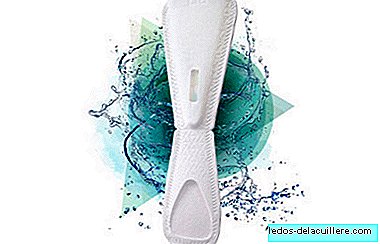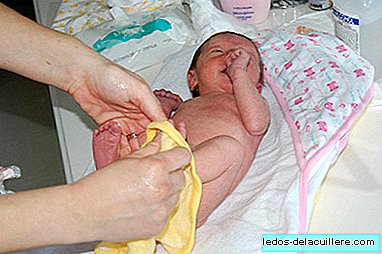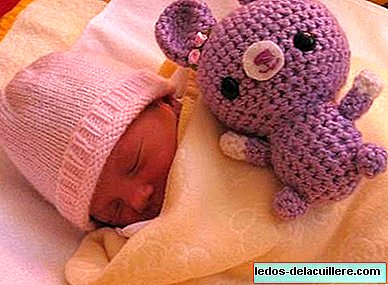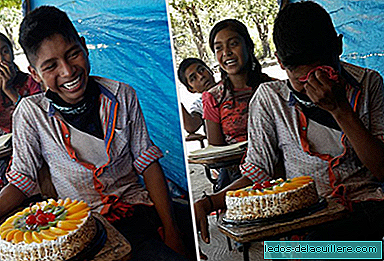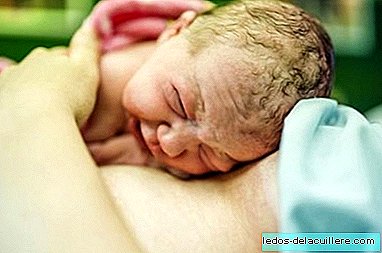
That is the question asked by the researchers of the Baby Biome Study project, directed by Peter Brocklehurst, from the University of Birmingham, in England.
They want to know If the lack of microbes from the mother's vaginal discharge in babies born by caesarean section, it may explain that they are more likely to develop diseases such as asthma and allergies over time.
And how will they do it? Analyzing the faecal samples of 80,000 babies, an unprecedented resource.
Scientists can analyze which microbes the body adopts first, what does that mean many years later and, something key, if harmful relationships with bad bacteria can be repaired.
Stool samples will be stored at the Wellcome Sanger Institute in Cambridge, England, where they will be studied by microbiologists.
The promoters of the study believe that the results will contribute to changing policies around the avoidable use of antibiotics and the medical protocols of caesarean sections.
An adaptive immune system
Graham Rook, professor of medical microbiology at the University of London (UCL), speaks to the BBC of the microbiome as "professor of our immune system." It is understood that the microbiome is the collection of bacteria, viruses, fungi and archaea that a person has.
"An adaptive immune system needs data to learn, just like our brain. And that data comes from the microbes and the chemicals that they produce, which can cause a reaction in the immune system that lasts a lifetime, "adds the microbiologist. But there is more:
"The initial set-up of the immune system occurs during the first weeks and months of life. We know it because during those first months if you give babies antibiotics you can interfere with their microbiome and then, as adults, those individuals are more likely have immune problems and more likely to be overweight, "explains Dr. Rook.
Hence the importance of what microbes the newborn comes into contact with before. This investigation opens the possibility of "to be able to grow moms' microbes to purposely colonize babies, to allow its microbiome to mature and develop in an optimal way, "the authors argue. That would be, in other words, a scientifically controlled version of a vaginal shower.
And why the douching?
That for the baby it is not the same to be born vaginally than by caesarean section, it is something that all experts are clear about.
Babies born by caesarean section usually receive their first bacteria from the delivery environment, not from their mother, since they do not pass through the birth canal.
This is because Babies are born sterile, without intestinal flora, ready to adopt maternal bacteria as soon as they come into contact with them, which in a way you already know. But this is not the case when they are born by caesarean section, so they are deprived of these immunological properties as soon as they are born.
And it seems that it has to do with the long-term immune response. It is associated with an increased risk of immune and metabolic disorders.
Hence the possibility of extracting the mother's vaginal discharge at birth and impregnating the newborn with her, to give her the bacteria she needs to grow healthier.
Background
It is not the first time that a line of research is opened on the immune system of babies and their relationship with the intestinal flora from which they are contaminated at birth. In fact we already talked about the subject in Babies and More.
But these studies on the human microbiome and its long-term impact conducted so far have been too small to be definitive.
One of them, published in February 2016 in the journal Nature Medicine, has already put into practice the idea of rub the face of newborns by caesarean section with a gauze previously introduced into the mother's vagina to impregnate it with its bacteria.
According to the authors of the research, it was proved that it is possible to restore, at least in part, the maternal bacteria that immunize babies born by vaginal delivery in those born by caesarean section.
And what do the specialists think?
Mercedes Calvo Alemán, gynecologist and obstetrician at the Hospital de la Paz in Madrid believes that the English study "is very promising, since it will be very exhaustive" but warns that:
"You have to be very careful with vaginal douches in babies, since not only does there not exist scientific evidence that they work, but they can also be harmful to the newborn."
It ensures that the practice of impregnating the baby with bacteria from the maternal vagina is not performed in any hospital. And use as reasons:
- The maternal vagina includes good bacteria that protect it, but also others that can become pathological.
For that reason, a culture is carried out on all pregnant women at week 35 of gestation, to detect a possible bacterium. A possibility that occurs in 20-30 percent of cases and that can be harmful to the newborn if it comes into contact with her in a vaginal delivery.
- Douching may be a possibility (still distant) in the case of women with normal vaginal flora, but how do you know if it is not contaminated?
You have to keep in mind that bacteria can make an appearance in the mother's vagina until the last moment and some of them are not even detected, as in the case of candinitis.
- Babies at birth come from a sterile world and with the immune system still immature, so you have to be extremely careful what you contact him with. Irrigating him with the maternal flow could even put him in danger.
Therefore, the doctor predicts that there is still a long way to a possible protocol in maternity of the douching.
We will have to wait to see the results of the London study to see if "that vaginal discharge of the mother has or not a sanitizing power for babies born by caesarean section.
Watch out! We have to wait
The same director of the research 'Baby Biome Study', Brocklehurst, warns that "right now Some parents believe that the hypothesis that maternal bacteria protect the baby in the long term, is strong enough to make your own vaginal shower. But that can have real disadvantages. "
Coincides with Dr. Calvo Alemán that One of the main concerns of scientists is that dangerous microbes can be transferred. It is estimated that up to a quarter of women carry type B strep in the vagina, and exposing babies to these bacteria could be fatal.
According to Brocklehurst, until we know for sure how the mechanisms work, "it is too early to start introducing bacteria into babies artificially."
In Babies and More Caesarean section: a pioneering initiative of the Vall d'Hebron Hospital, A new study finds that the way of birth and cognitive development could be related



